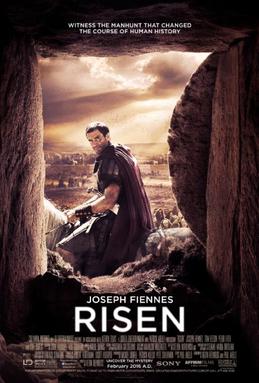| Risen | |
|---|---|
 |
by Peter J. O'Connell
Risen. Released: Feb. 2016. Runtime: 107 mins. MPAA Rating: PG-13 for Biblical violence, including some disturbing images.
The lawman is stonefaced, tight-lipped and firmly focused on finding out the facts of the mystery that he has been tasked to solve. Pursuing his mission, he grills witnesses and suspects, raids brothels, exhumes corpses and casts a dragnet far and wide. Eventually, he finds his quarry—a dead man walking, and talking.
No, Risen, directed and co-written by Kevin Reynolds, is not a Gary Cooper Western or a Dirty Harry movie or an episode of Law and Order or CSI. It's Christian cinema. The lawman is Clavius (Joseph Fiennes), an officer in the Roman forces controlling the Empire's remote and restive province of Judaea in 33 A.D. The lawman's assignment, given to him by the governor, Pontius Pilate (Peter Firth), is to find out what happened to the body of the perp Yeshua, a/k/a Jesus of Nazareth, a troublemaker who was executed and entombed one day but whose body was gone from the tomb, even though the tomb was guarded, two days later.
We first encounter Clavius wandering in the desert. He stops at a very primitive inn and tells the story of his experiences—which involve becoming part of what Christians will come to call “the greatest story ever told”--to the innkeeper (Tomas Pozzi). The movie then follows Clavius' account.
After winning a brutal, bloody battle with Jewish rebels led by Barrabas, the Roman observes the crucifixion and death of Yeshua (Cliff Curtis) in Jerusalem. A few days later Pilate sends Clavius, aided by Lucius (Tom Felton), on his mission, which Clavius pursues with methodical determination.
Eventually, Clavius finds himself in a room with the followers of Yeshua, who pays a visit there, alive as alive can be, shows the wounds that killed him and then disappears. Yeshua has told his followers to seek him in Galilee, which they do, accompanied by Clavius. After a nice catch of fish, they meet up with Yeshua again. After more miraculous doings and some deep discussions between Yeshua and Clavius under the stars, Yeshua promises his followers that he will create a home for them, bids farewell and vanishes in a blinding light.
Pilate, believing that Clavius has betrayed him, has sent troops after Clavius and Yeshua's followers, but the Roman and the followers evade them, so Pilate gives up the pursuit and concludes that he will never encounter Clavius or the followers again.
As Clavius finishes his account, he is asked by the innkeeper if he believes in Yeshua. Clavius says that he does. He is, however, struggling to reconcile what he has witnessed with what he knows from his previous experiences of the world. He resumes his wandering in the desert.
By using aspects of the police procedural genre, Kevin Reynolds adds a fresh, new approach to “the greatest story.” His location shooting in very striking areas of Spain and Malta also adds much to the drama. As for Joseph Fiennes' performance as Clavius, although stonefacedness can be a powerful form of screen acting, it's power is much increased--as Cooper and Eastwood understood—if from time to time flickers of emotion move across the stone. Such flickers are few and far between on Fiennes' face in this flick. Regarding Pilate, of the two traditional interpretations—a man torn between pragmatism and respect for the Nazarene and a man who is a cold bureaucrat—Peter Firth chooses the latter. Cliff Curtis' effective portrayal of Yeshua is a kind of combination of the “gentle Jesus, meek and mild” of the traditional hymn with the buddy/jock/regular guy of Pound's poem “The Goodly Fere.”
Overall, Risen, though lacking the spectacular scale and scope of the sword-and-sandal epics of the 1950s, is a worthy work with much of interest, even to non-Christians.
No comments:
Post a Comment